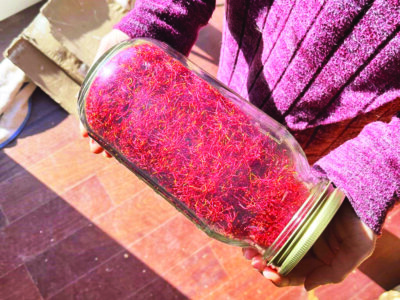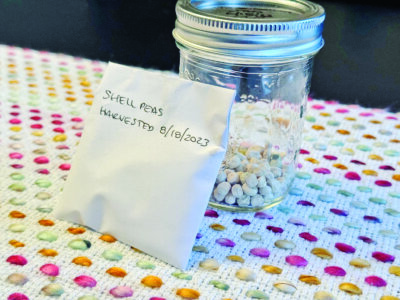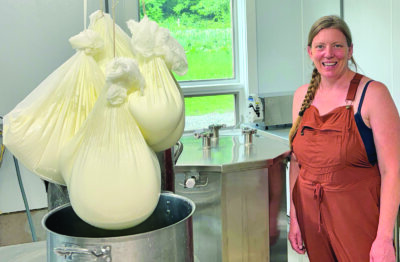Memories of when only pink margarine was legal in VT
For salad de Madison, there’s no need to travel to the second-most populous city in Wisconsin, and you can also skip James Madison’s Virginia home. Forgo that famous garden in New York City, and rest assured: the ballistic missile submarine the USS James Madison was scrapped in 1997.
For a tasty salad de Madison, and lots more, go to Monday Munch at the Charlotte Senior Center on Ferry Road.

This salad is delicious, but the butter and margarine for bread and rolls have a contentious history. When margarine, invented by a French chemist, was first introduced to the U.S. market in 1873 as a cheaper substitute for butter, one tactic of dairy producers lobbying against it was to argue for restricting margarine’s color: Don’t let it look like butter.
Wisconsin declared that using yellow margarine was a crime. In 1884, Vermont passed a law requiring that margarine be pink.
When World War II produced butter shortages, margarine gained in popularity. Many of us of a certain age remember that white glob coming from the grocery store in a plastic bag, looking like a second cousin of the sticky white paste sitting in big jars in every classroom.
The glob in our kitchens was white because of the dairy industry’s ingenuity in getting politicos to tax yellow margarine. The margarine bag contained a little piece of dye. By squeezing the bag, we could bust that dye, and with lots of kneading the white mass turned yellow and voila: It looked like butter.
In “The Butter Wars: When Margarine was Pink,” National Geographic tells how first lady Eleanor Roosevelt got involved in the margarine-butter wars. Appearing in a TV commercial, she said she ate margarine on her toast.
We can anticipate a TV ad with Melania sitting in a Tesla.
Pro-butter political cartoonists pictured factories dropping everything from stray cats to soap, paint, arsenic and rubber boots into the margarine mix; and a barrage of dubious scientific reports hinted that margarine caused cancer, or possibly led to insanity. Nonetheless, by the 1970s, Americans were eating about 10 pounds of margarine per person per year. But by 2014, butter was again our favorite spread: 5.6 pounds per person of butter a year is consumed, as opposed to a dwindling 3.5 pounds of margarine.
Meanwhile, the two varieties of chicken soup at upcoming Monday Munches reflect how very important chicken is in our diet. Indicative of the times, “Grandma’s Wartime Kitchen: World War II and the Way We Cooked” has a recipe for chicken bone soup.
The Chicken of Tomorrow contest somehow has a very contemporary feel to it. In the summer of 1945, the contest, organized by the USDA, with the backing of A&P and with 55 national organizers — scientists and bureaucrats loaned from government agencies, producer organizations, land-grant colleges, joined by hundreds of volunteers — all had the goal of producing bigger chickens.
In the 1950s, producers discovered feed laced with antibiotics allowed chickens to grow twice as fast, and these days, 80 percent of antibiotics sold in the U.S. are used in livestock.
These videos are worth watching: The Trouble with Chicken, Chickens with John Oliver and Why is Chicken so Cheap.
For a very colorful look at chickens, see “Art of the Chicken: A Master Chef’s Paintings, Stories and Recipes of the Humble Bird,” by Jacques Pépin, personal chef to three French heads of state, including Charles de Gaulle and Emmy recipient for his TV show with Julia Child. Pépin describes cooking at The Plaza in the 1950s and preparing vol au vent financiere, or chicken banker’s style: the comb, the wattles under the beak, the kidneys and, when available, unlaid eggs removed from slaughtered hens.
Besides offering lots of stories and recipes, Pépin has fun with his paintings: Angry Chicken, Proud Rooster, Militant Chicken, Untroubled Chicken, Chicken Goddess, Reflecting Rooster, Dancing Rooster, Pineapple Chicken. Lunatic Chicken and lots more. The book, featuring Hippie Cock on the cover, is available at the Charlotte Library.
Historical note: Chicken Lyonnaise was one of the dinner choices when, on April 14, 1912, passengers in the first-class dining room were served 10 elaborate courses, each with a different wine. First came oysters, then soup, then filet mignon or chicken. There were also courses of vegetables, lamb, roast duckling or beef sirloin. Lots of choices for dessert, too.
Then, just before midnight, the Titanic hit an iceberg, and passengers discovered that their ship carrying lots of food lacked sufficient lifeboats.
Recommended: Webster’s Dictionary sends out a word a day. And it goes beyond offering a definition of that word. Recently, besides the definition, the reader found entries entitled “Flowering Etymologies for your Spring Garden,” “‘In Vino Veritas’ and Other Latin Phrases to Live By” and “The Many Plurals of ‘Octopus’.”
Here’s one of those Latin phrases to live by: “Post hoc, ergo propter hoc.” It refers to the logical mistake of claiming that one thing caused another just because it happened first.
For example, the rooster crows and the sun rises, but to argue that the rooster’s crowing causes the sun to rise would be post hoc, ergo propter hoc reasoning.
Suggestion: Send post hoc, ergo propter hoc complaints to D.C. politicos along with this piece from Science in The Public Interest.
Everything is, indeed, connected.
Monday Munch
April 7, 11:30 a.m.-12:30 p.m.
Lemon chicken orzo soup, salad de Madison and M&M cookie bars.
April 14, 11:30 a.m.-12:30 p.m.
Spring chicken with barley soup, salad, bread and homemade dessert.
Note: A wonderful children’s book has been added to The Little Free Library for Kids at the Grange, 2858 Spear Street. In “Frank & Ernest” by Alexandra Day, a bear and an elephant learn diner lingo, including “Adam and Eve on a raft, wreck’em,” which means scrambled eggs on toast and “fry two, let the sun shine,” meaning two fried eggs with unbroken yolks.
Related Stories
Popular Stories
If you enjoy The Charlotte News, please consider making a donation. Your gift will help us produce more stories like this. The majority of our budget comes from charitable contributions. Your gift helps sustain The Charlotte News, keeping it a free service for everyone in town. Thank you.
Andrew Zehner, Board Chair










